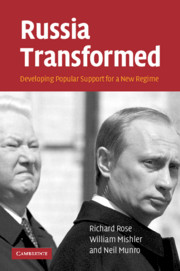Book contents
- Frontmatter
- Contents
- List of figures
- List of tables
- Acknowledgments
- Introduction Transformation and its aftermath
- 1 Time matters: the dynamics of regime support
- 2 The supply of regimes: democratic and autocratic
- 3 A changing supply of Russian regimes
- 4 Uncertainties of transformation: a view from the bottom
- 5 Changing levels of regime support
- 6 Social structure and the evaluation of regimes
- 7 The influence of political values and performance
- 8 Finding the economic influences that matter
- 9 The impact of the passage of time
- 10 What could challenge the new equilibrium?
- Appendix A New Russia Barometer samples
- Appendix B Coding of variables
- References
- Index
1 - Time matters: the dynamics of regime support
Published online by Cambridge University Press: 22 September 2009
- Frontmatter
- Contents
- List of figures
- List of tables
- Acknowledgments
- Introduction Transformation and its aftermath
- 1 Time matters: the dynamics of regime support
- 2 The supply of regimes: democratic and autocratic
- 3 A changing supply of Russian regimes
- 4 Uncertainties of transformation: a view from the bottom
- 5 Changing levels of regime support
- 6 Social structure and the evaluation of regimes
- 7 The influence of political values and performance
- 8 Finding the economic influences that matter
- 9 The impact of the passage of time
- 10 What could challenge the new equilibrium?
- Appendix A New Russia Barometer samples
- Appendix B Coding of variables
- References
- Index
Summary
Time is the dimension in which ideas and institutions and beliefs evolve.
Douglass NorthNo decade in the history of politics, religion, technology, painting, poetry and what not ever contains its own explanation. In order to understand the religious events from 1520 to 1530 or the political events from 1900 to 1910 you must survey a period of much wider span. Not to do so is the hallmark of dilettantism.
Joseph A. SchumpeterWhile the moment when a new regime is proclaimed can be a televised event, establishing support for a new regime is a process. It takes time for subjects to learn about the strengths and weaknesses of the new regime and time to unlearn much that was taken for granted in the old regime. Reducing the complicated process by which people come to terms with a change in regimes to a single point in time is, as Schumpeter emphasizes, a sign of refusing to take a change of regimes seriously. It is a luxury that cannot be afforded by people who live through transformation and its aftermath.
To understand the dynamics of regimes, it is essential to recognize the difference between changes within a regime and changes between regimes. The former happens with considerable frequency; for example, elections offer regular opportunities for changing the persons or party in charge of government. The Communist Party of the Soviet Union managed a series of changes in leadership without disrupting the regime.
- Type
- Chapter
- Information
- Russia TransformedDeveloping Popular Support for a New Regime, pp. 16 - 28Publisher: Cambridge University PressPrint publication year: 2006



